Aretas IV.
Aretas IV. Philopatris (Harithath; actually Aeneas ) was king of the Nabataeans from about 9 BC. Chr. To 40 AD He is considered one of the most important known kings of the Nabataeans and is therefore also known as "Aretas the Great". The Nabataean Empire reached its peak under his reign.
At 9 BC Aeneas became after the death of his (presumed) brother Obodas III. as Aretas king of the Nabataeans. His relationship to the royal court could never be fully clarified. The suffix “IV.” Is just a modern numbering of the well-known Nabatean kings. On Nabatean inscriptions he is usually called: Aretas, King of Nabatu, who loves his people . Hence the addition Philopatris , "who loves his fatherland". Aretas IV had two wives: Huldu ( Chuldu , 1–16) and Shaqilath ( Shuqeilat , his sister, from 23).
His daughter Phasaelis married Herod Antipas . After Herod divorced her in order to marry Herodias , his brother's wife and mother of Salome , Phaesalis fled back to her father. Relations between Herod and Aretas had been strained because of border disputes, and so Aretas invaded Judea in winter 33/34 and took possession of the area along the Jordan, including the areas around Qumran . The historian Flavius Josephus linked these military conflicts with the beheading of John the Baptist , which occurred around the same time and which Herod Antipas ordered.
Under the reign of Aretas the Nabataean Empire reached its greatest expansion: in the south the northern Hejaz (above Hegra), in the west the Sinai peninsula and in the north the Hauran . Aretas had a large theater built in the Nabatean capital of Petra . Over time it was expanded from the original 3,000 seats to around 7,000.
The New Testament reports that Paul of Tarsus was persecuted in Damascus by the governor of King Aretas:
“In Damascus, the governor of King Aretas had the city of Damascus guarded in order to arrest me. But through a window I was let down the city wall in a basket and so I escaped him. "
Aretas IV died around the year 40. His eldest son Malichus II was his successor. At 49 years of age, Aretas' reign was the longest known reign of any Nabatean kings.
literature
- Ulrich Wilcken : Aretas 4 . In: Paulys Realencyclopadie der classischen Antiquity Science (RE). Volume II, 1, Stuttgart 1895, Col. 674.
- Manfred Lindner: Petra and the Kingdom of the Nabataeans. Habitat, history and culture of an ancient Arab people. 4th edition, Verlag Delp, Munich and Bad Windsheim 1983.
- Tobias Nicklas: Aretas. In: Michaela Bauks, Klaus Koenen, Stefan Alkier (Eds.): The Scientific Biblical Lexicon on the Internet (WiBiLex), Stuttgart 2006 ff.
Individual evidence
- ↑ www.tourism.jo
| personal data | |
|---|---|
| SURNAME | Aretas IV. |
| ALTERNATIVE NAMES | Aretas IV. Philopatris; Harithath; Aeneas; Aretas the great |
| BRIEF DESCRIPTION | King of the Nabataeans |
| DATE OF BIRTH | 1st century BC Chr. |
| DATE OF DEATH | at 40 |
